A niche blog has a focused topic, unlike blogging without a niche. Blogging without a niche in mind can be dangerous because your efforts are likely to produce no results.
You see, starting a blog can be exciting, but diving into a specific niche can make it even more rewarding. In 2024, niche blogging is the way to go. It allows you to connect with a targeted audience and establish yourself as an expert in a particular field. This guide will help you understand how to start a niche blog and make it successful.
1. What is a Niche Blog?
A niche blog focuses on a specific topic, interest, or audience. Unlike general blogs, a niche blog narrows down its content to one particular area. This could be anything from vegan recipes, vintage fashion, or DIY home improvement tips. By concentrating on a niche, you cater to a specific group of readers who share that interest.
Focusing on a niche is crucial because it helps you stand out in the crowded blogging world. When you target a specific audience, you attract readers who are genuinely interested in your content. This leads to higher engagement and loyalty. Moreover, it makes content creation easier and more enjoyable since you are writing about something you are passionate about.
Subniche
A subniche in blogging is a more specific, focused topic within a broader category (or niche). Think of it like zooming in on one particular aspect of a larger subject.
Example:
- Niche: Health and Fitness
- Subniches:
- Yoga for Beginners
- Keto Diet Recipes
- Mental Health for Teens
- Strength Training for Women Over 40
- Subniches:
Each subniche targets a specific audience with particular interests or needs, making it easier to create content that resonates deeply with that group. By focusing on a subniche, you can attract a more engaged audience and face less competition compared to a broader niche.
1.1 Benefits of Starting a Niche Blog in 2024
Starting a niche blog in 2024 offers many benefits.
- First, it allows you to build a dedicated audience. People are always looking for information that matches their interests.
- Second, it enhances your chances of ranking higher in search engines. Search engines love focused content, and a niche blog is perfect for that.
- Third, it opens up opportunities for monetization. Brands and advertisers prefer niche blogs for collaborations because they can target their marketing efforts more effectively.
- Lastly, it helps you establish authority. When you consistently provide valuable content in a specific area, readers see you as an expert, which can lead to more opportunities and growth.
1.2 Current Trends in Blogging
Blogging remains a powerful tool for sharing knowledge and connecting with like-minded individuals. Recent stats show that there are over 600 million blogs globally, with millions of posts published daily. This indicates a healthy and thriving blogging community.
Market insights reveal that readers are increasingly seeking specialized content. General blogs are losing traction, while niche blogs are gaining popularity. People want detailed, expert information on specific topics.
According to RankIQ, the most successful niches in terms of blogs with over 50,000 monthly sessions are food at 42.8%, lifestyle at 13.3%, and travel at 10%
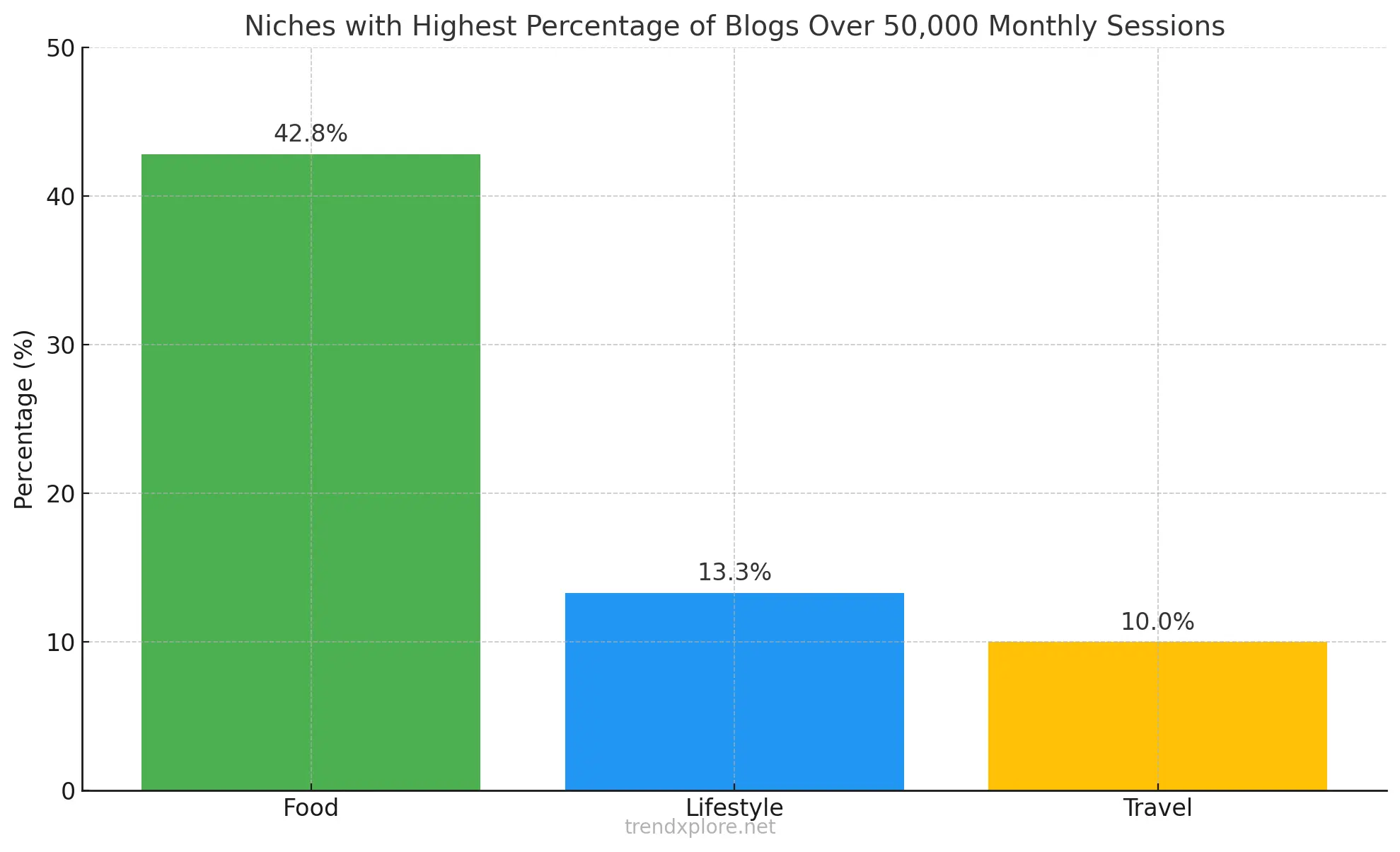
1.3 Advantages of Niche Blogging
Better Audience Targeting
Starting a niche blog allows you to focus on a specific audience. You can tailor your content to meet their needs and interests. This makes your blog more relevant and valuable to your readers. As a result, they are more likely to follow, share, and engage with your posts.
Increased Engagement and Loyalty
When your blog targets a niche, you attract readers who are passionate about your topic. These readers are more likely to engage with your content, leave comments, and participate in discussions. This builds a loyal community around your blog.
Monetization Opportunities
Niche blogs often have better monetization prospects. Advertisers prefer to place their ads on blogs that cater to specific audiences. You can also explore affiliate marketing, sponsored posts, and selling digital products tailored to your niche.
2. Choosing Your Niche
Selecting the right niche is crucial for the success of your niche blog. Let’s explore how you can find the perfect niche blog topic.
2.1 Identifying Your Passion and Expertise
Brainstorming Topics You Are Passionate About
Start by listing topics that excite you. What do you enjoy talking about or researching in your free time? Your passion will drive your blog’s success. Writing about something you love makes content creation enjoyable and sustainable.
Assessing Your Knowledge and Expertise
Next, evaluate your expertise. What subjects do you know a lot about? Your unique insights will set your niche blog apart from others. Combining passion with expertise creates a solid foundation for your blog.
2.2 Researching Market Demand and Competition
Tools and Methods for Market Research
Use tools like Google Trends and keyword research tools to gauge market demand. Search for your potential niche topics and see how popular they are. High search volume indicates strong interest, which is crucial for your niche blog’s growth.
Analyzing Competition and Identifying Gaps
Check out other blogs in your potential niche. Analyze their content, engagement, and audience. Look for gaps or areas they haven’t covered well. This helps you identify unique angles to differentiate your niche blog.
2.3 Evaluating Profitability and Sustainability
Monetization Potential
Consider how you can make money from your niche blog. Popular methods include affiliate marketing, sponsored content, and selling digital products. Research if there are affiliate programs or brands willing to sponsor content in your chosen niche.
Long-Term Sustainability of the Niche
Think about the future of your niche. Will people still be interested in this topic in a few years? Choose a niche that isn’t just a fad. Sustainable niches ensure long-term growth and profitability for your niche blog.
Finding the perfect topic for your niche blog involves a mix of passion, expertise, and research. By identifying what you love and know, researching market demand, and assessing profitability, you can choose a niche that sets your blog up for success.
3. Setting Up Your Niche Blog: A Step-by-Step Guide
Starting a niche blog can be exciting but also a bit overwhelming. Follow this step-by-step guide to set up your blog successfully.
3.1 Choosing the Right Blogging Platform
Comparison of Popular Blogging Platforms
- WordPress.org
- Pros: Highly customizable, vast array of plugins, strong community support, full control over your site.
- Cons: Requires a bit of technical know-how, must manage your own hosting.
- Blogger
- Pros: Simple to use, hosted by Google, integrates well with Google services.
- Cons: Limited customization, fewer plugins, less control over your blog.
- Wix
- Pros: User-friendly drag-and-drop builder, beautiful templates, includes hosting.
- Cons: Less flexibility compared to WordPress, can get expensive with premium features.
Pros and Cons of Each Platform
- WordPress.org is great for those who want full control and customization. It’s perfect for a niche blog that might grow and need more features over time.
- Blogger is ideal for beginners who want a straightforward, no-fuss platform.
- Wix offers a balance of ease of use and design flexibility, making it good for those who want a stylish blog without much technical effort.
3.2 Selecting a Domain Name and Hosting Provider
Tips for Choosing a Memorable and SEO-Friendly Domain Name
- Keep it Short and Simple: A short, easy-to-remember domain name sticks in people’s minds.
- Include Keywords: Incorporate relevant keywords for your niche blog to help with SEO.
- Avoid Numbers and Hyphens: These can be confusing and are often mistyped.
- Make it Brandable: Choose something unique that stands out and reflects your niche blog’s identity.
Recommended Hosting Providers for Niche Blogs
- Bluehost – replace this with your recommendation
- Affordable plans
- Free domain name for the first year
- 24/7 customer support
3.3 Designing Your Blog
Choosing a Theme and Customizing Your Blog’s Appearance
- Select a Theme: Choose a theme that aligns with your niche blog’s content and style. Free themes are available, but premium themes offer more features and customization.
- Customize: Adjust the colors, fonts, and layout to match your brand. Ensure your design is clean and easy to navigate.
Importance of Responsive Design and User Experience
- Responsive Design: Ensure your blog looks good on all devices, including smartphones and tablets. Most themes are responsive, but always check this feature.
- User Experience (UX): Focus on creating a pleasant experience for your visitors. This includes fast loading times, easy navigation, and clear calls to action.
4. Creating High-Quality Content for Your Niche Blog
High-quality content is the cornerstone of a successful niche blog. Let’s break down how to create engaging and valuable content step-by-step.
4.1 Understanding Your Audience
Creating Audience Personas
Start by defining who your readers are. Create audience personas to represent different segments of your audience. For example, if your niche blog is about healthy eating, one persona might be “Health-Conscious Harry,” a 30-year-old professional who wants quick, nutritious recipes. Another might be “Fitness Fiona,” a 25-year-old athlete looking for meal plans to support her training.
Identifying Their Needs and Preferences
Once you have your personas, think about their needs and preferences. Health-Conscious Harry might prefer articles on meal prepping, while Fitness Fiona might want high-protein recipes. Understanding these needs helps you create content that resonates with your audience.
4.2 Content Planning and Strategy
Developing a Content Calendar
A content calendar helps you plan and organize your posts. Decide how often you will post and what topics you will cover. For instance, plan to publish a new recipe every Monday, a nutrition tip every Wednesday, and a workout plan every Friday. This consistency keeps your audience engaged and coming back for more.
Types of Content to Create
- Articles: Write detailed posts that provide value, such as “10 Quick and Healthy Breakfast Ideas.”
- Videos: Create tutorial videos, like “How to Prepare a Balanced Meal in 30 Minutes.”
- Infographics: Share visual content, such as a chart showing the nutritional benefits of different foods.
4.3 Writing Compelling Blog Posts
Crafting Catchy Headlines and Introductions
Your headline should grab attention. Use action words and make it specific, like “Transform Your Morning with These 5-Minute Smoothie Recipes.” The introduction should hook readers by addressing a problem or posing a question they care about.
Tips for Writing Engaging and Informative Content
- Be Conversational: Write as if you’re speaking to a friend. This makes your niche blog more relatable.
- Use Short Paragraphs and Bullet Points: These make your content easier to read.
- Add Personal Stories and Examples: Share your experiences to connect with your audience. For example, describe how you improved your diet using the tips you’re sharing.
- Add images: Did you know that according to Orbitmedia, Bloggers incorporating seven or more images per post are 2.3 times more likely to experience significant results?
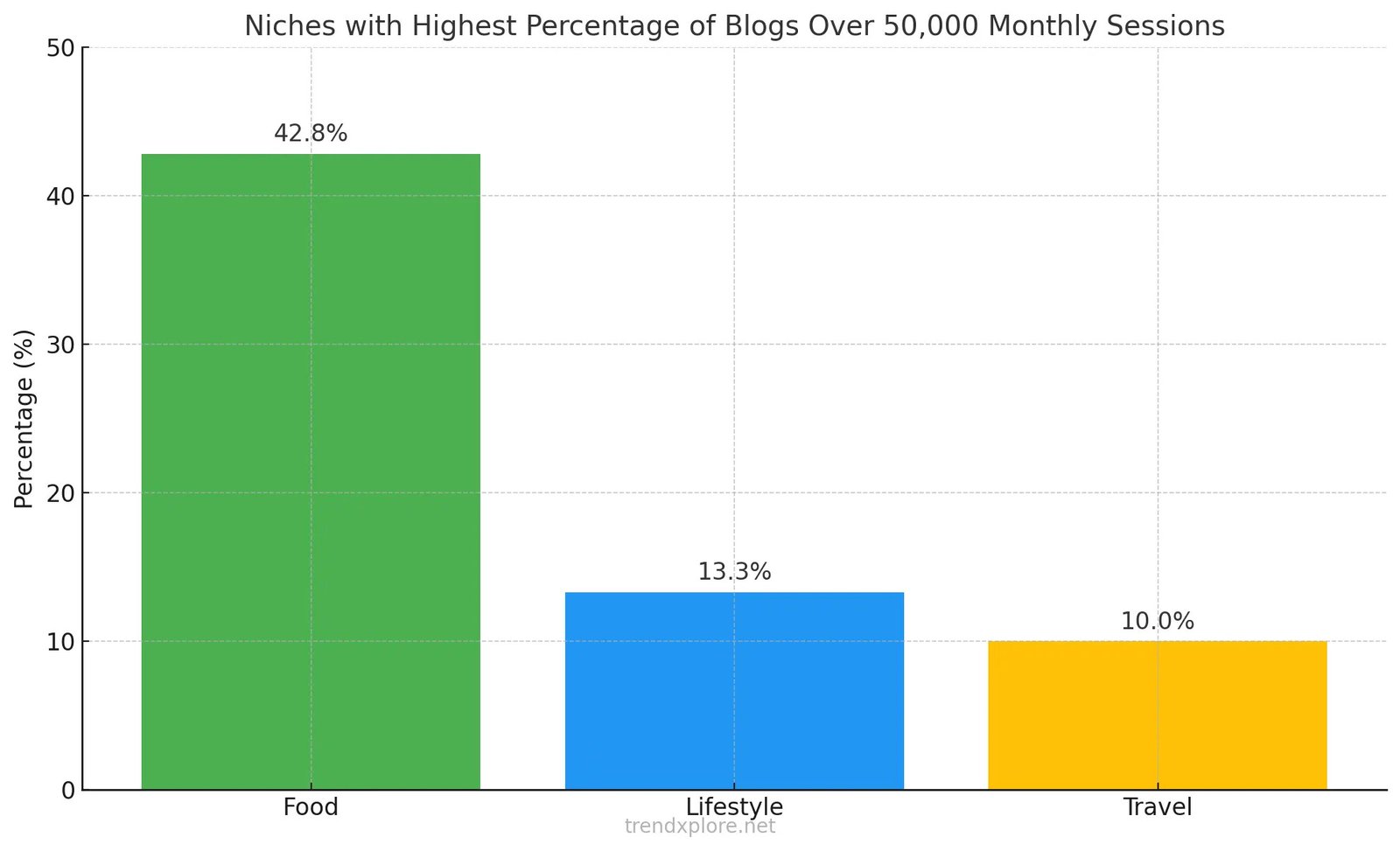
4.4 Optimizing Content for SEO
On-Page SEO Techniques
- Keywords: Use relevant keywords naturally throughout your post. For a niche blog on healthy eating, include terms like “healthy recipes,” “nutrition tips,” and “meal planning.”
- Meta Descriptions: Write a concise summary of your post for search engines. This should include your main keyword and entice users to click.
- Alt Text: Describe your images with keywords. This helps with accessibility and SEO.
Importance of Internal and External Linking
- Internal Linking: Link to other posts on your blog. This keeps readers on your site longer and helps search engines understand your content. For example, in a post about breakfast recipes, link to another post about healthy snacks.
- External Linking: Link to reputable sources that support your information. This builds trust with your readers and enhances your blog’s credibility. For example, link to a study on the benefits of a balanced diet.
5. Promoting Your Niche Blog: Strategies for Driving Traffic
Creating great content is just the beginning. To make your niche blog successful, you need to drive traffic to it. Here are some effective strategies.
5.1 Social Media Marketing
Leveraging Social Media Platforms to Promote Your Blog
Social media is a powerful tool to promote your niche blog. Choose platforms where your audience is most active. For example, if your niche blog is about fashion, Instagram and Pinterest are great choices. Share your blog posts, behind-the-scenes content, and engage with your followers.
Creating Shareable Content and Engaging with Your Audience
Make your content shareable by adding social sharing buttons to your blog. Create eye-catching graphics and write compelling captions. Engage with your audience by responding to comments, hosting live sessions, and running polls or Q&A sessions. For instance, share a snippet of a new blog post about summer fashion trends and ask your followers for their favorite summer outfits.
5.2 Email Marketing
Building an Email List
Start building an email list from day one. Offer something valuable, like a free e-book or exclusive tips, in exchange for email sign-ups. Place sign-up forms on your blog, especially at the end of posts and in the sidebar.
Creating Effective Email Campaigns
Send regular newsletters with updates, new blog posts, and exclusive content. Personalize your emails by addressing your subscribers by name and tailoring content to their interests. For example, if you run a niche blog about vegan cooking, send a weekly newsletter with new recipes, cooking tips, and product recommendations.
5.3 Guest Blogging and Collaboration
Benefits of Guest Blogging
Guest blogging on other blogs in your niche can help you reach a wider audience. It establishes you as an authority and drives traffic back to your niche blog. For example, if you write a guest post about sustainable living on a popular eco-friendly blog, their readers may visit your blog for more insights.
How to Find and Approach Potential Collaborators
Find blogs that complement yours and have a similar audience. Approach them with a personalized email, offering a unique angle for a guest post. Highlight how it will benefit their readers. For example, if you have a niche blog about fitness, collaborate with a nutrition blog for a guest post on workout nutrition tips.
5.4 Using Paid Advertising
Overview of PPC Advertising
Pay-per-click (PPC) advertising can give your niche blog a traffic boost. Google Ads and Facebook Ads are popular choices. Google Ads display your blog in search results, while Facebook Ads target users based on interests and demographics.
Setting a Budget and Measuring ROI
Start with a small budget and test different ads to see what works best. Track metrics like click-through rate (CTR) and conversion rate to measure ROI. For example, if you spend $50 on Facebook Ads promoting a guide on your niche blog, track how many clicks and sign-ups you get to see if it’s worth the investment.
Promoting your niche blog requires a mix of strategies. By leveraging social media, building an email list, guest blogging, and using paid advertising, you can drive traffic and grow your blog’s audience. Each method offers unique benefits, and when used together, they create a powerful promotion plan for your niche blog.
6. Monetizing Your Niche Blog: Turning Your Passion into Profit
Did you know that, according to research, 28% of bloggers begin earning money within the first six months, and 34% achieve a full-time income within two years of launching their blog?
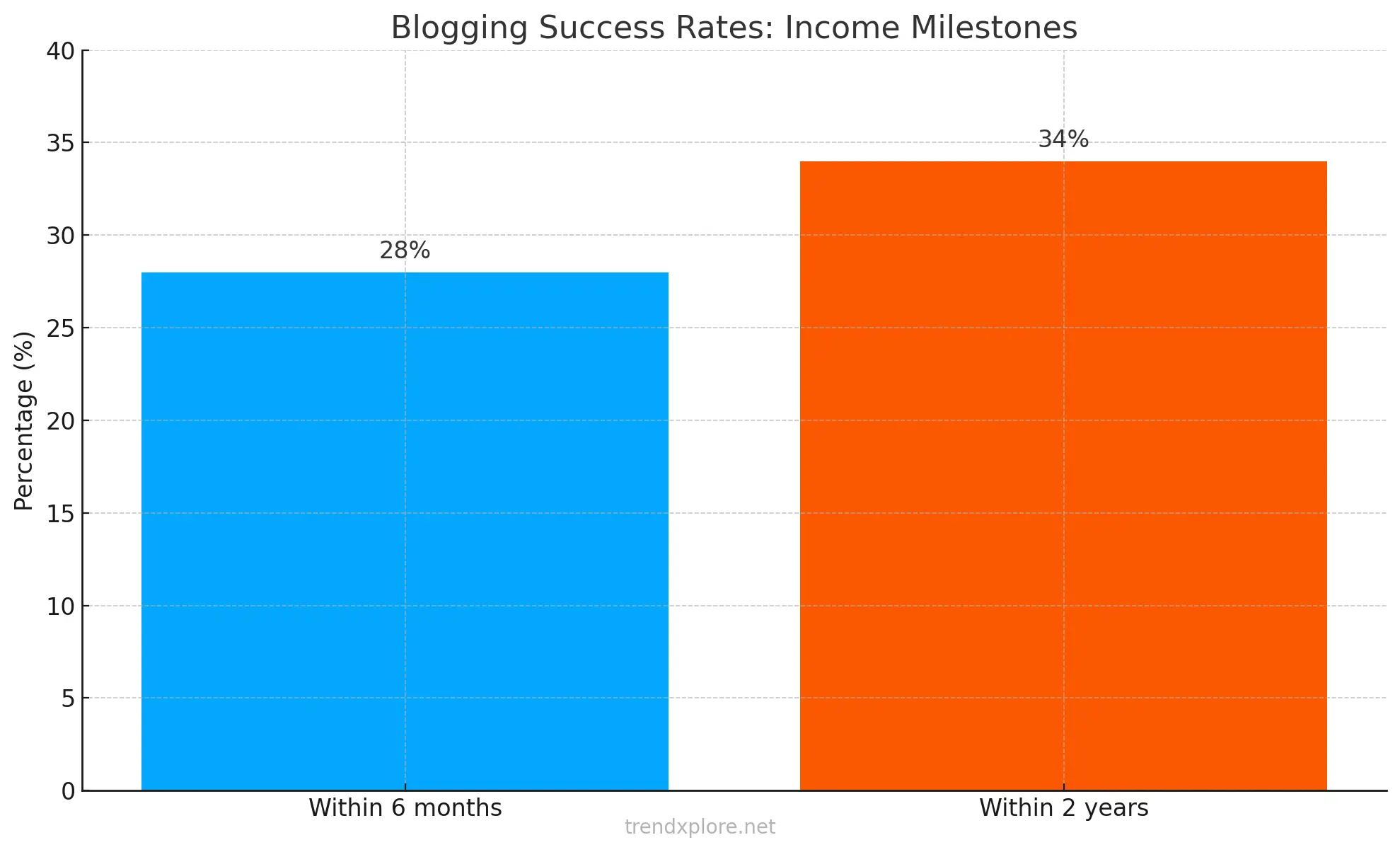
Creating a successful niche blog opens up various monetization opportunities. Let’s explore how you can turn your passion into profit.
6.1 Affiliate Marketing
Choosing Affiliate Programs Relevant to Your Niche
Select affiliate programs that align with your niche blog’s content. For example, if your niche blog focuses on fitness, join affiliate programs for fitness equipment, health supplements, and workout gear. Popular affiliate networks like Amazon Associates, ShareASale, and ClickBank offer a wide range of products to choose from.
Strategies for Effective Affiliate Marketing
- Integrate Naturally: Incorporate affiliate links naturally into your content. Write product reviews, create listicles, or recommend products within relevant blog posts. For instance, in a post about home workouts, include links to your favorite resistance bands and yoga mats.
- Disclose Affiliations: Be transparent with your audience about affiliate links. This builds trust and complies with legal requirements. For example, add a disclaimer at the beginning or end of your post stating that it contains affiliate links.
- Use Data and Analytics: Track which links perform best and focus on promoting those products. Use tools like Google Analytics to understand your audience’s preferences and behavior.
6.2 Sponsored Content and Partnerships
How to Attract Sponsors and Negotiate Deals
To attract sponsors, build a strong online presence and engage with your audience regularly. Reach out to brands that align with your niche blog. For example, if your blog is about sustainable living, contact eco-friendly brands. Send them a media kit showcasing your blog’s statistics, audience demographics, and previous collaborations.
When negotiating deals, be clear about your rates, deliverables, and expectations. For example, specify if the deal includes a blog post, social media promotion, or a combination of both. Always ensure that the partnership benefits both parties.
Creating Authentic and Valuable Sponsored Content
Maintain authenticity when creating sponsored content. Ensure that the products or services you promote are relevant and valuable to your audience. For instance, if you run a travel blog, collaborate with a travel gear company to review their new backpack. Share honest opinions and personal experiences to maintain credibility.
6.3 Selling Products and Services
Developing and Selling Your Own Products
Creating your own products can be a lucrative way to monetize your niche blog. Consider what your audience needs and develop products to meet those needs. For example:
- E-books: Write an e-book on a topic you frequently blog about, such as “30-Day Healthy Meal Plan.”
- Online Courses: Develop a course based on your expertise. For instance, if your niche blog is about photography, create a course on “Mastering DSLR Photography.”
Offering Consulting or Other Services
Leverage your expertise to offer consulting services. For example, if your niche blog focuses on digital marketing, offer personalized marketing strategies or one-on-one coaching sessions. Promote these services through your blog and social media channels.
7. Measuring Success and Growing Your Blog
Monitoring your progress and continually improving are essential for a thriving niche blog. Let’s explore how to measure success and foster growth.
7.1 Tracking Your Blog’s Performance
Key Metrics to Monitor
- Traffic: Monitor the number of visitors to your niche blog. This includes unique visitors, page views, and sessions. Increased traffic often indicates growing interest and reach.
- Engagement: Track metrics like average session duration, bounce rate, and social shares. High engagement means your content resonates with readers.
- Conversions: Measure actions that fulfill your goals, such as email sign-ups, product purchases, or clicks on affiliate links. Conversions show how effectively your blog meets its objectives.
Tools for Tracking and Analyzing Performance
- Google Analytics: A comprehensive tool to track traffic, user behavior, and conversions. For example, use it to see which posts attract the most visitors and where they come from.
- Google Search Console: Helps you monitor your site’s presence in Google search results. It provides insights into search queries, click-through rates (CTR), and indexing issues.
- Social Media Analytics: Platforms like Facebook, Twitter, and Instagram offer insights into engagement and reach for your social media content.
7.2 Continuous Improvement and Adaptation
Regularly Updating and Refreshing Content
Keep your content fresh and relevant. Update old posts with new information, fix broken links, and improve SEO. For example, if you have a post on “Best SEO Practices in 2022,” update it to reflect new trends and techniques for 2024. This keeps your niche blog current and useful for readers.
Staying Updated with Industry Trends and Adapting Your Strategy
Stay informed about the latest trends in your niche. Follow industry blogs, join forums, and subscribe to newsletters. Adapt your content strategy based on these trends. For instance, if a new social media platform is gaining popularity, start creating content for that platform to reach a broader audience.
7.3 Building a Community Around Your Blog
Engaging with Your Audience Through Comments and Forums
Respond to comments on your blog and engage in conversations. This shows readers you value their input and fosters a sense of community. For example, if a reader asks a question about a recipe on your food blog, respond with helpful advice and additional tips.
Hosting Webinars, Live Chats, or Q&A Sessions
Create opportunities for direct interaction with your audience. Host webinars on topics of interest, like “10 Tips for Effective Home Workouts” for a fitness blog. Live chats and Q&A sessions can also help you connect with readers in real-time, answer their questions, and gain insights into their needs.
Concluding Thought
Starting a niche blog in 2024 is a rewarding journey that allows you to share your passions, connect with like-minded people, and potentially earn an income. By carefully choosing your niche, creating high-quality content, and promoting your blog effectively, you can build a successful niche blog that stands out. Remember, consistency and persistence are key.
Success comes with consistency and dedication, so keep up with trends, refine your content, and actively engage with your readers. What are your thoughts on starting a niche blog? Could it be your next fulfilling project?
Frequently Asked Questions
What is a niche blog?
A niche blog focuses on a specific topic or audience, unlike general blogs that cover a wide range of subjects. This specialization helps attract a targeted audience interested in that particular subject.
How do I choose a niche for my blog?
Choose a niche by considering your passions, expertise, and market demand. Research popular topics, analyze competition, and evaluate the profitability of different niches to find one that suits you best.
Can I change my niche after starting my blog?
Yes, you can change your niche, but it may affect your existing audience and SEO. It’s best to carefully choose your niche from the beginning to avoid significant changes later.
How often should I post on my blog?
Consistency is more important than frequency. Start with a manageable schedule, such as once a week, and ensure each post is high-quality. As you grow, you can increase your posting frequency.
How can I promote my blog?
Promote your niche blog through social media, email marketing, guest blogging, and collaborations. Create engaging content and share it across different platforms to reach a wider audience.
How do I monetize my niche blog?
You can monetize your niche blog through affiliate marketing, sponsored content, selling products or services, and offering premium content or memberships. Choose methods that align with your niche and audience.
How long does it take to see success with a niche blog?
Success varies for each blogger. It depends on factors like content quality, promotion efforts, and niche competitiveness. Stay patient and persistent; most bloggers start seeing significant results after 6 months to a year.
What tools do I need to start a niche blog?
Essential tools include a blogging platform (like WordPress), domain name, hosting service, SEO tools, and content creation tools. These tools help you set up, optimize, and manage your niche blog efficiently.
Can I start a niche blog with no technical skills?
Yes, many blogging platforms offer user-friendly interfaces that require no technical skills. You can find plenty of tutorials and resources online to help you get started and manage your niche blog.

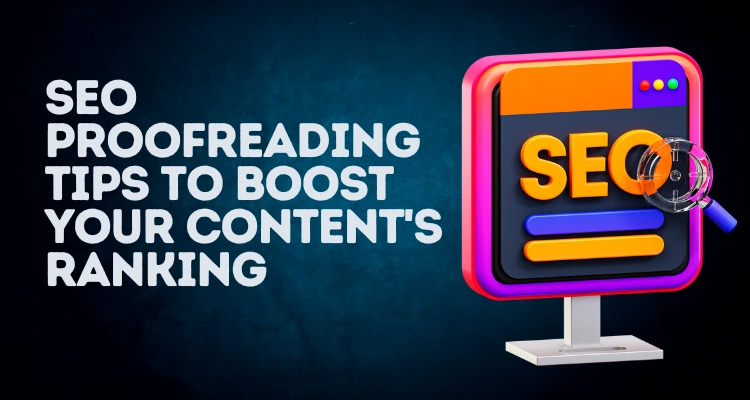
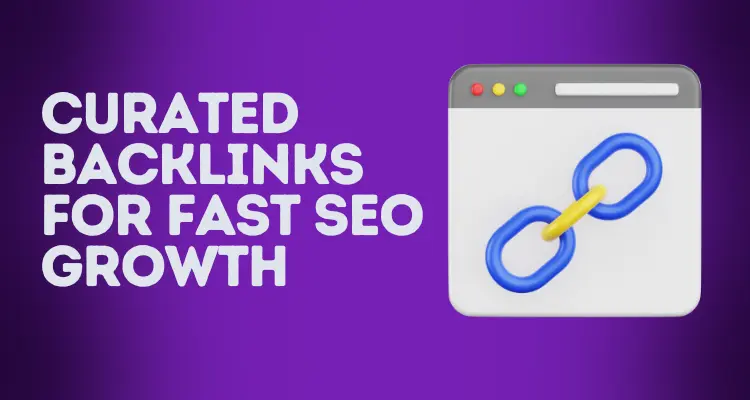




Thank you for explaining what a niche and sub niche is. I am looking into creating my own website so I feel that it is important to know about these before I start something up.
I always want to put in 100% with whatever I do. Your idea though to just see what I come up with is intriguing. I guess I need to see what my readers want and take I think from there. After all the readers dictate the direction of my site.
Hi, Yudee.
This is a great article about choosing the perfect niche! I had all the 5 questions in my mind when I was just starting out Internet Marketing. And you have answered them perfectly straight to the point! Another great resource I can share with my friends who are just starting out Online!
Wishing you the best!
Hi Yudee, what a great post you have there talking about niche.
Let’s say I have a niche (A) that is not as popular as the other niche (B), though I like the former one better.It is because I am more familiar with niche A and as you said I could use my skills.
However, I used alexa.com to anaylize the top websites of niche A and found that the traffic is 20 times lower than niche B.
To me traffic equals conversion, the more traffic my site would have, the better it converts. Should I go for niche B instead?
thank you,really helpful tips
Thanks for sharing your thoughts on selecting a niche. I like what you said about not dwelling too much on what you’re going to select and that it is more important to simply get started.
I think at times we can worry too much about making things perfect rather than taking action and then we end up not doing anything at all.
This a very helpful post on choosing a niche. It seems hard at first to choose a niche as there are so many categories to choose from but your article explains very well on how to go about choosing one. This is a must read for anyone who is planning to start a business especially an online business. Thanks for a great article!
You are welcome
I have been wondering about that. I have hearn internet marketers talking about a “niche”,but to me it sounded like a niche in the wall. What you are basically saying is that any topic or sub-topic is a niche. right? So I pick the topic I am interested in most, right?
Not actually a topic. U can generate topics from writing about a niche…
Nice post Yudee, this is really supportive for anyone struggling with locating the right niche and all the parameters of a sub niche.
Do you think a persons niche needs to be something they are passionate about?
I go back and forth on this, but i feel that if i have passion its easy to write, but if another niche that i dont have a passion for but has better earning potential arises, then i still think its worth creating content for.
Hey Yudee,
I really like the information and ideas that you have listed in your article. I see it all the time where people just pick a topic like weight loss, and they fail to narrow it down to a more specific area. This also goes for the domain name. I like the questions that you have posted and the reviews. People can definitely get a good start here and when they connect with wealthy affiliate, and spending time building their website, they will definitely be on their way to having a successful site and a business.
Thanks for your information, I will pass this along to others.
Angela
It’s important to start the first website on a niche that you really passionate about. Many blogger who want to make money as soon as possible simply burn out before they even make a cent online.
Write for your passion and to create value, and you will work on your website consistently. Choosing a niche shouldn’t be over-complicated.
I like the way you defined the niche and sub niche.
As far as the domain name is concerned, I know it is proper to get a domain name close to the niche but is that necessary? Is it necessary for the name to have similar keywords as the niche?
Thanks for breaking it down.
Not really necessary.. But it’s cool if the niche has a say in your domain name
Nice article, it really helped me understand correctly the notion of “niche”. I had a pretty hard time finding the right niche, because I was trying to find both something I liked and something that could bring me money (for example a cooking niche wouldn’t be that profitable, in my opinion). I found the right one in the end, at least that’s what I think, so I’m on the good way I believe.
Regarding including some part of your niche name in the domain name you choose, I haven’t done this and I don’t think I will. I simply chose a brand name that I thought appropriate for my site, and chose that one as a domain name.
I believe that getting a domain name that includes your niche name partially will bring your higher rankings faster, however.
Thanks for these tips, your post was really useful
Hi Yudee, I just looked at your website page Perfect Niche, Its a great topic and has great information, You have awesome content.
Keep up the good work, Keith